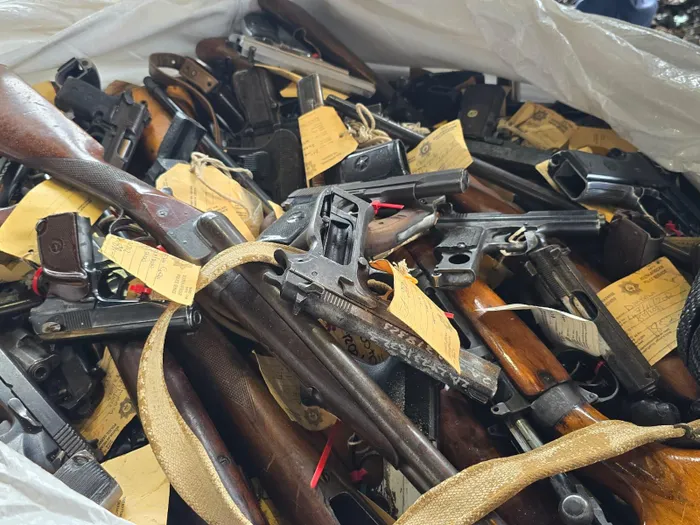Hawks remain silent on status of recovery of 2,000 stolen Prinsloo guns

State-owned guns ending up in the hands of criminals point to widespread corruption within the SA Police Service.
Image: SAPS
THE Hawks are still unable to confirm how many of the more than 2 000 illegal firearms that former police officer Colonel Christiaan Prinsloo sold to gangsters have been recovered.
Between 2007 and 2015, while he was head of SAPS’s Gauteng Firearms, Liquor and Second-Hand Goods Unit, Prinsloo ran a covert operation where thousands of confiscated or decommissioned police guns were stolen from government stores and sold to gang leaders in the Western Cape.
Prinsloo was convicted and sentenced to 18 years imprisonment in 2016 on 13 charges related to the illegal supply of 2000 police firearms.
According to a SAPS 2016 project report into the matter, a Ballistic Audit found that these guns were linked to scores of crimes across the province, including 1066 murders, 1403 attempted murders and 315 other crimes over a five year period between 2010 to 2016.
Approached for comment on how many of the 2000 guns had been recovered, Hawks spokesperson Siyabulela Vukubi, would only say: “We can only confirm that the matter is still in court hence we cannot give comment on it.”
He did not respond to further questions around, what specific case he was referring to and what was being done about the weapons that had not been recovered.
Gun Free South Africa’s (GFSA), Claire Taylor said: “With 33 South Africans shot dead every day, the Madlanga Commission and Parliamentary Committee must prioritise establishing accurate firearm record-keeping, gathering evidence of firearm-related criminality, ensuring genuine accountability and strengthening legislative frameworks as SA’s historic and systemic failure to control firearms is a key enabler of organised crime.”
In May 2023, GFSA applied for certification of a class action against the South African Police Services (SAPS) on behalf of affected families for deaths and injuries resulting from failed police-controlled firearms management systems. GFSA is engaging with the state through the legal process to access information about how many of the Prinsloo guns have not been recovered and whether they've been linked to other crimes.
The class action aims to hold SAPS accountable for crimes committed by Prinsloo who had confessed to stealing state arms to sell to criminals. The nine applicants are the parents or guardians of children (some adults, some under 18) who were shot and killed or wounded, and some are gunshot survivors themselves.
The State opposed the application in June 2023 and filed an answering affidavit in around October 2023.
The organisation said while class actions are notoriously time-consuming, as applicants need to prove the existence of a defined class and meet strict legal requirements, “together with our legal team we remain committed to securing justice for the families affected by these stolen firearms”.
“GFSA filed a rule 35(12) / (14) notice in around November 2023 calling for the respondents to produce certain documents and the respondents partly responded in February 2024. A further request for documents in terms of rule 35(12) / (14) was filed by GFSA in late April / May 2025 and GFSA received some of this documentation last week,” said Taylor.
“GFSA has provided trauma debriefing and ongoing support for the families. The legal journey is long and emotionally taxing, and we remain committed to ensuring families have access to the psychological and practical support they need. This case represents far more than one corrupt official. It exposes systemic failures in South Africa's firearms control system that have cost thousands of lives. Every day we delay accountability, more families are devastated by violence enabled by state negligence. We owe it to the victims and survivors to ensure this never happens again and that starts with holding those responsible to account and fixing the broken systems that allowed it to happen,” said Taylor.
Cape Times